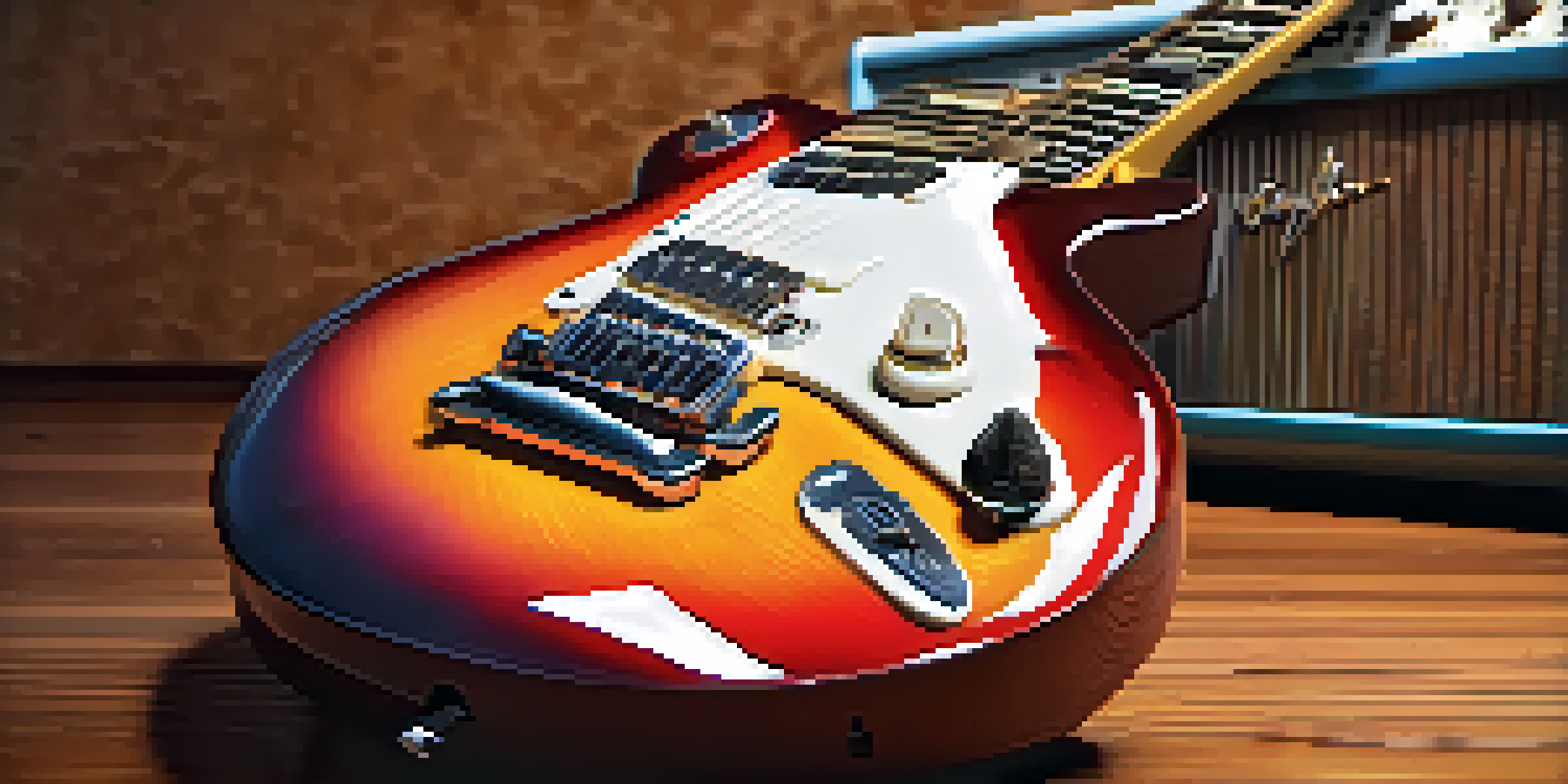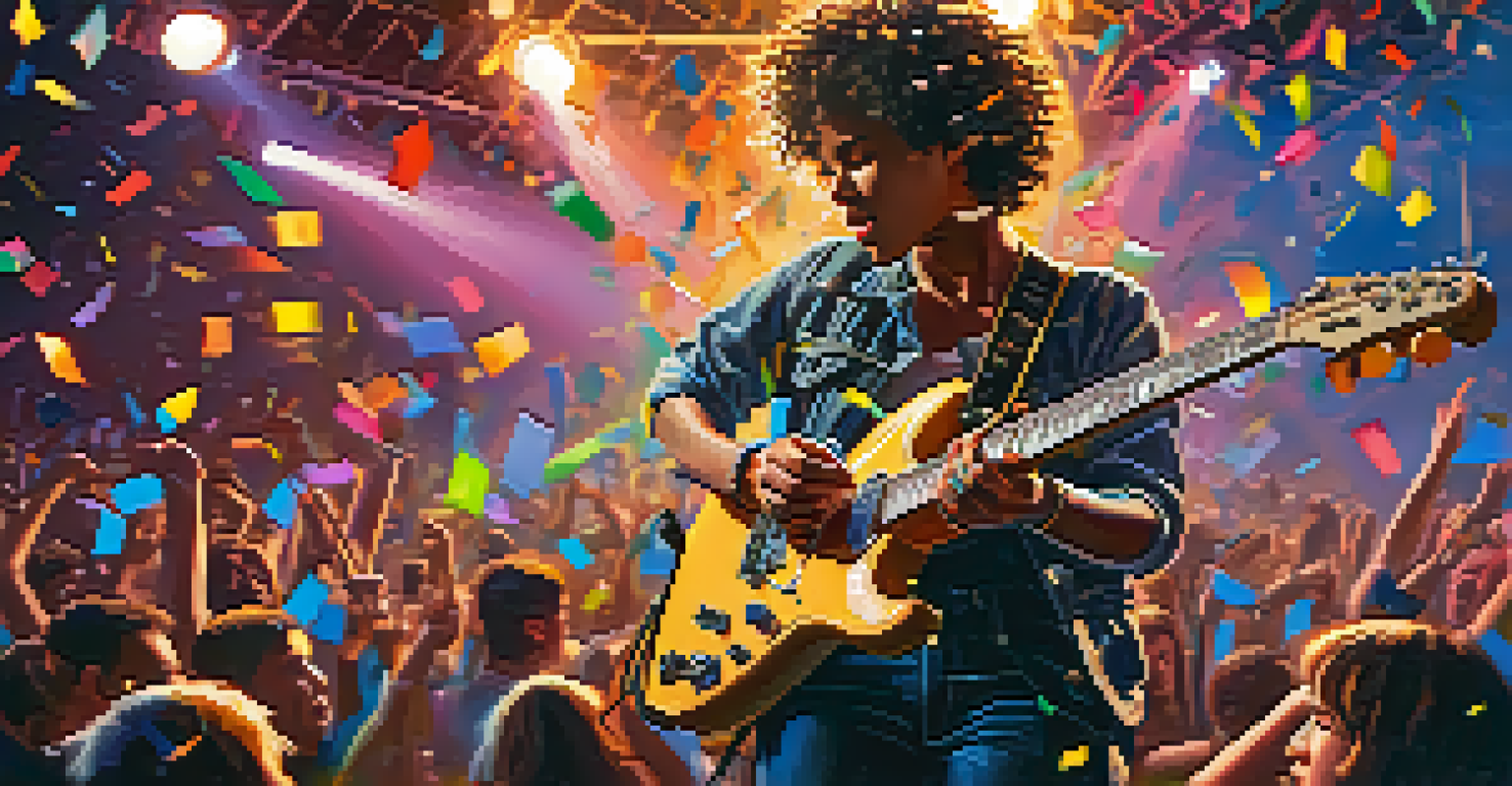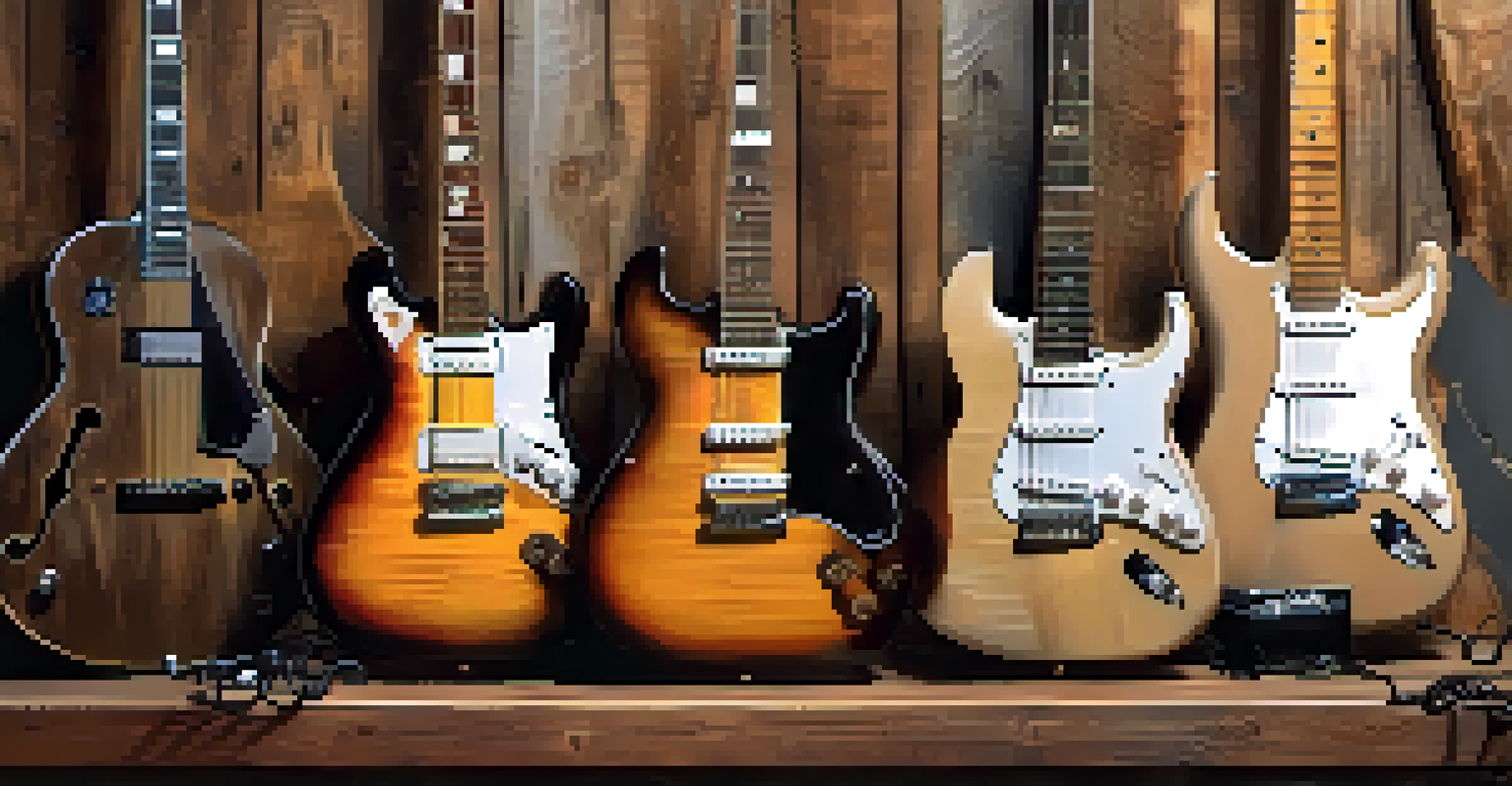The Impact of Electric Guitar on Modern Pop Music Trends

The Rise of the Electric Guitar in Popular Music
The electric guitar burst onto the scene in the 1930s, revolutionizing music with its distinctive sound. This instrument quickly became synonymous with rock and roll, influencing countless artists and genres. Its ability to produce a wide range of tones and effects invited creativity, setting the stage for modern pop music.
The electric guitar is a symbol of rebellion and creativity in music.
As pop music began to evolve in the late 20th century, the electric guitar took center stage, from the catchy riffs of the Beatles to the electrifying solos of Jimi Hendrix. These artists demonstrated how the guitar could drive a song's energy and emotion, captivating audiences worldwide. This trend has continued, with the electric guitar remaining a staple in pop music.
Today, the electric guitar is not just a relic of the past; it continues to shape the soundscape of contemporary pop. Whether it's a subtle background riff or a powerful solo, the guitar helps define the genre's identity, bridging the gap between classic and modern sounds.
Electric Guitar Sounds: Shaping Modern Pop Genres
Modern pop music is a melting pot of various influences, and the electric guitar plays a pivotal role in this fusion. From the catchy pop-punk riffs of artists like Paramore to the smooth jazz-infused melodies of artists like John Mayer, the electric guitar adapts to fit diverse styles. This versatility allows it to remain relevant across different pop subgenres.

Moreover, the incorporation of electric guitar sounds can elevate a pop track, making it more dynamic and engaging. For instance, when artists like Dua Lipa or The Weeknd weave guitar riffs into their songs, they create a sound that feels both fresh and nostalgic. This blend of old and new keeps listeners hooked and enhances the overall musical experience.
Electric Guitar: Pop Music's Backbone
The electric guitar serves as a crucial element in pop music, shaping melodies and driving energy across various genres.
Additionally, collaborations between pop artists and rock guitarists have become increasingly common, further stretching the boundaries of pop music. These partnerships lead to innovative soundscapes that attract a wider audience, showcasing the electric guitar's enduring influence.
The Electric Guitar and Songwriting in Pop Music
Songwriting in pop music often hinges on memorable melodies and hooks, and the electric guitar is a fantastic tool for crafting these elements. Writers frequently utilize guitar riffs as the backbone of a song, providing a catchy motif that listeners can easily remember. This reliance on guitar-driven hooks has become a hallmark of successful pop tracks.
Music is a way to express what you feel and the electric guitar helps convey that emotion.
For example, songs like 'Shape of You' by Ed Sheeran showcase how a simple guitar progression can become the foundation for an entire hit. This technique highlights the electric guitar's role not just as an accompaniment but as a vital component of songwriting. The instrument's unique tones can inspire creativity, leading to innovative song structures.
Moreover, the songwriting process often involves experimenting with different guitar sounds, which can lead to unexpected breakthroughs. This creative experimentation keeps the genre fresh and allows songwriters to push the envelope, resulting in innovative music that resonates with audiences.
Iconic Electric Guitarists Influencing Pop Music Today
Throughout history, many iconic electric guitarists have left an indelible mark on pop music. Artists like Slash from Guns N' Roses and Eddie Van Halen have inspired countless musicians with their groundbreaking techniques and unforgettable riffs. Their influence extends into modern pop, as newer artists often cite these legends as major inspirations.
In today's music scene, guitarists like Niall Horan and Lizzy Hale continue this legacy by incorporating their unique styles into pop songs. Their ability to blend rock elements with pop sensibilities exemplifies how the electric guitar remains a driving force in shaping the genre. This connection to the past keeps the music alive and relevant.
Technology Revamps Guitar Sounds
Advancements in technology have transformed how electric guitars are used, enabling artists to experiment and innovate within pop music.
Additionally, social media platforms have allowed emerging guitarists to showcase their talents, influencing a new generation of pop artists. As these young musicians draw inspiration from iconic players, they contribute to an ever-evolving musical landscape that honors the electric guitar's rich history.
Electric Guitar in Pop Music Music Videos
Music videos have become an essential part of pop culture, and the electric guitar often takes the spotlight in these visual narratives. From flashy performances to cinematic storytelling, the guitar adds a layer of excitement and energy that enhances the overall experience. Iconic imagery of artists rocking out on electric guitars solidifies the instrument's status in pop music.
Take, for instance, Taylor Swift's 'Blank Space,' where the electric guitar features prominently, complementing the song's themes of love and heartbreak. The guitar's presence in the video amplifies the emotional impact, making it a memorable visual experience. This synergy between sound and image is crucial in today's visual-first music landscape.
Furthermore, the electric guitar often represents rebellion and freedom in pop music videos. Artists frequently use the instrument to convey their artistic identity, making bold statements about their music and values. This visual connection reinforces the electric guitar's role as a symbol of creativity and self-expression.
Impact of Technology on Electric Guitar and Pop Music
Advancements in technology have revolutionized the way electric guitars are played and recorded, significantly impacting pop music. Digital effects, loop pedals, and software have allowed artists to experiment with sound in ways previously unimaginable. This technological evolution has led to innovative techniques that keep the electric guitar relevant in modern music.
For example, the use of virtual amplifiers and effects can create unique tones that enhance a pop song's character. Artists like Billie Eilish have embraced these technological tools to develop a distinct sound, demonstrating how the electric guitar can adapt to contemporary music trends. This fusion of technology and artistry opens up new avenues for creativity.
Future: Guitar's Role in Pop Evolution
As music evolves, the electric guitar remains essential, blending with new genres and technologies to captivate audiences.
Moreover, the rise of home recording studios has democratized music production, allowing more musicians to explore electric guitar sounds. This accessibility leads to a more diverse range of influences within pop music, as aspiring artists can experiment and share their creations with the world. The electric guitar remains a powerful tool in this new era of music-making.
Future of Electric Guitar in Pop Music
As pop music continues to evolve, the future of the electric guitar looks promising. While genres like hip-hop and electronic music have gained prominence, the guitar still holds a vital place in the hearts of many artists and listeners. Its ability to convey emotion and energy ensures that it will remain a key player in the pop music landscape.
Emerging artists are increasingly blending genres, incorporating electric guitar elements into their work. This fusion creates fresh sounds that attract diverse audiences, proving that the electric guitar can adapt to changing musical tastes. The instrument's versatility keeps it relevant, allowing it to transcend genre boundaries.

Furthermore, as technology continues to advance, we can expect to see even more innovative uses of the electric guitar in pop music. Whether through new effects, playing techniques, or collaborations, the electric guitar will undoubtedly shape the future of pop music in exciting ways.